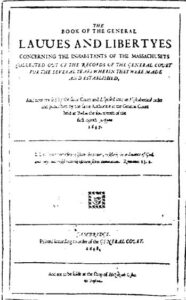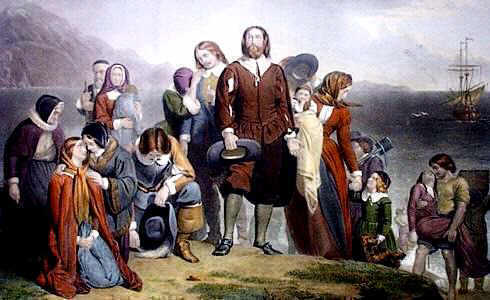Joel McDurmon recently announced his new book, God’s Law and Government in America and writes, “Introducing: a book of openly theonomic sermons from the American founding era.”
The above introduction is interesting in its obscurity and, in particular, McDurmon’s use of the adjective theonomic is telling. As Colin Pearson describes in his start-up podcast named “DatPostMil” (the April 29 episode with Sye Ten Bruggencate), the term “theonomic” is used to soften the terminology and broaden the philosophy’s definition to mean those who “love God’s Law” and increase its acceptance. In fact, this is an intentional approach to take very specific philosophical tenets of theonomy and broadens it to a generalized dishonesty.
Such intentional blurring of terms makes profitable debate impossible. “Theonomy” asserts that the Judicial Code given to the body politic of Old Testament Israel is obligatory today. “Theonomic” means those who love or highly value “God’s Laws.” The difference between the two terms is enormous. This term, theonomic, is being applied to – most tragically, by some well-meaning but ignorant brothers – those who believe both the first and second table of the Moral Law should be enforced, like the pre-1788 American revision of the Westminster would assert.
Enforcement of the Moral Law or its applicability to civil governments today is not a doctrinal distinctive of the theonomist philosophy. Applying the term theonomic retroactively to those who believed in the enforcement of the first table of Moral Law (enforcing the second table has traditionally not been disputed as the role of civil government) is wholly disingenuous and historically erred. Theonomy, rather, deals in the realm of the civil of code of ancient Israel and not God’s immutable Moral Law. While there are genuine disagreements between Reformed Christians who differ on whether both tables or only the second should be enforced by civil government (those who would hold to the pre-1788 version of the Westminster or the 1788 revision), that’s not uniquely distinctive to the theonomy conundrum (that particular debate would be an incredible one to have and is tragically overlooked as we bicker about Israel’s judicial code).
The book is chiefly a reprinting of a series of sermons preached within the first 180 years of American colonization of the New World, including a 1742 sermon “The Great Blessing of Good Rulers Depends upon God’s Giving His Judgment and His Righteousness to Them” by Nathaniel Appleton, and McDurmon writes the introductions. McDurmon writes…
We are literally living in the midst of the very tyrannies for which our fathers left England, and against which our early preachers railed from the pulpit for over 180 years afterward. And for this loss—for which the modern pulpit is largely to blame—we are now facing the same mess as the first pilgrims and puritans before they left.
No doubt, McDurmon is right that we live in the midst of tyrannies – and in reality, these are comparably much worse than the reign of the English monarchy over the American colonies. McDurmon is also right that – like the Puritans and Pilgrims that founded certain of the colonies – we should turn to the Word of God to find solutions to the nation’s problems (hint: the solution is the Gospel). What seems to be implied, however, is that like the colonial preachers, we need to instill and adopt a so-called theonomic persuasion. These early colonial Christians were by and large not theonomist, however much they believed – to their credit – that God’s Word should be the foundation for civil government. And more to the point, the first system of American government was not theonomist and neither was it the broader, more conveniently invented term, theonomic.
There certainly were a tiny minority that suggested what Rushdoony, Bahnsen, North or other 20th century founders of the theonomy desired. John Cotton, for example, in his Moses and His Judicials and An Abstract of the Lawes of New England argued for a strict implementation of Israel’s civil code, but Cotton seems to have all but flatly ignored by the Puritans who crafted Massachusetts’s earliest laws.
And yet, eighteen years after beginning the process, the colonial believers produced not a theonomist rule of law, but one of a uniquely Christian and non-theonomist legal code.

Producing the Book of General Laws and Liberties (1648), the Puritan-led government – after asking for pastors, clergy and religious leaders for nine years to give detailed input (Cotton was one of those) – crafted a document that was wholly lacking in strict implementation of Mosaic civil code. Rather, these laws were a general reflection of the Moral Law and not in the slightest the civil code.
In fact, the preamble of that legal code says this:
That distinction which is put between the Laws of God and the laws of men becomes a snare to many as it is misapplied in the ordering of their obedience to civil Authority; for when the Authority is of God and that in way of an Ordinance, Romans 13. I, and when the administration of it is according to deductions, and rules gathered from the word of God, and the clear light of nature in civil nations, surely there is no humane law that tends to common good (according to those principles) but the same is immediately a law of God, and that in way of an Ordinance which all are to submit unto and that for conscience sake.
Clearly, the most “theonomic” Christians that colonial America (and arguably, the world) has to offer – after nine years of combining the theological prowess of the great body of godly minds and Bible scholars that virtually all modern Reformed Christians admire – created a body of laws that specifically assert that the laws of man, whether rules gathered from the word of God or the “clear light of nature in civil nations,” any “humane law that tends to the common good” is the law of God and should be submitted to by all men.
Certainly men like Cotton and Appleton (who was born 50 years after the establishment of law in Massachusetts) existed and propagated their minority perspectives, but their assertions seem to have been roundly rejected by these great Reformed minds in lieu of a legal system that was premised by the Moral Law of God and not civil code of Israel.

McDurmon also points to the writings of another member of colonial clergy, James Dana. After a brief quotation from Dana, McDurmon writes…
“In order to understand the thrust of Dana’s points properly, we must remember that the year was 1779: Connecticut had just the previous year ratified the Articles of Confederation of the United States of America. Each point he makes is not only taken directly from Mosaic political doctrine, but calculated to confirm to the young American mind that they were on the right track with their infant ‘confederacy’.”
Again, McDurmon is right in his preliminary suggestion, but not his final conclusion. We should understand the laws of Connecticut and their eventual submission to the new Confederacy’s rule of law. The first laws of Connecticut were the Fundamental Orders. These eleven orders mirrored closely that which was crafted by those in Massachusetts, but they were also predicated by a stirring sermon by Thomas Hooker* in 1638. In the sermon, Hooker demanded from his Scriptural perspective a highly valued democratic – and not theocratic – rendering of authority vested in the civil magistrate under the will of a common people utilizing the Moral Law of God but not implementing the civil code of Israel (such talk is almost absent from Hooker’s work).
…they who have power to appoint officers and magistrates it is in their power also to set the bounds and limits of the power and places unto which they call them reason because the foundation of authority is laid 1stly in the free consent of people
[line]
[*Editor’s note: Joel McDurmon called Penn state to complain that we uploaded this document instead of hyperlinking it, so we’ve amended it at the request of Penn State Press. When we originally uploaded the document, it wasn’t behind their pay-wall. We pray that things speed up at American Vision, so Joel has more edifying things to concern himself with.]
[line]
The picture painted of colonial theonomy is rejected by history itself, both in the majority position of the colonial Reformed community, and by the system of laws they created. While more godly and impressively committed to the the Holy Scripture than we, their allegiance to the Bible as the civil government’s ultimate authority makes all-the-more their legal system’s silence on Mosaic civil code all the more deafening. The sermon virtually establishing the first legal system of Connecticut and preached by Hooker was a championing of democratic principles, and yet founder of theonomy, RJ Rushdoony would violently disagree. He writes that in This Independent Republic (1978) that democracy…
…came into existence as revivals of paganism and as anti-Christian movements, whatever their ostensible claims otherwise.
What American Vision and Joel McDurmon need to do a much better job of doing is articulating the views of theonomy founders that demonstrate their perception not of America’s founding as a glorious age to which we should return, but an atrocious departure from their Reconstructionist vision. One wonders what system theonomists are trying to reclaim, as they laud America’s founding as a time when we almost got it right. Even the most ardent post-millennialist would have trouble explaining in their self-pronounced “positive eschatology and worldview” if the Puritans were “theonomic” then why the nation so quickly spiraled into disrepair and degeneracy. One would think that once established – if we’re to believe that’s what the Puritan’s supported – their system of theonomy so quickly failed – and failed abysmally.
Gary North’s view of America’s founding as a sovereign nation and the establishment of the Constitution as being a drastic and terrible departure from God’s intended system of government – not a golden era to which we should return, claimed that Article VI is a “legal barrier to Christian theocracy” (Political Polytheism, 681). A Christian theocracy founded upon strict adherence to the Mosaic civil code, of course, is entirely different from the goal of these early colonial Christians and completely antithetical to both the United States Constitution and the earlier colonial legal systems.
Let us, like the early colonial Christians and our elder Reformed brethren, look to the Scriptures in the shaping of law. Let us not, like American Vision, revision history do so.
[Contributed by JD Hall]











